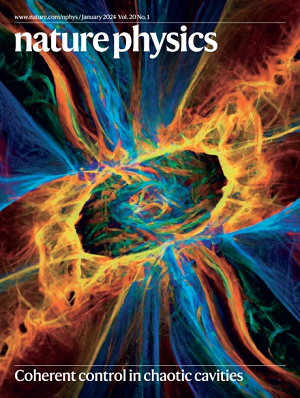Strain tuning of vestigial three-state Potts nematicity in a correlated antiferromagnet
IF 17.6
1区 物理与天体物理
Q1 PHYSICS, MULTIDISCIPLINARY
引用次数: 0
Abstract
Electronic nematicity is a state of matter in which rotational symmetry is spontaneously broken and translational symmetry is preserved. In strongly correlated materials, nematicity often emerges from fluctuations of a multicomponent primary order, such as spin or charge density waves, and is termed vestigial nematicity. One widely studied example is Ising nematicity, which arises as a vestigial order of collinear antiferromagnetism in the tetragonal iron pnictide superconductors. Because nematic directors in crystals are restricted by the underlying crystal symmetry, recently identified quantum materials with three-fold rotational symmetry offer a new platform to investigate nematic order with three-state Potts character. Here we demonstrate strain control of three-state Potts nematicity as a vestigial order of zigzag antiferromagnetism in FePSe3. Optical linear dichroism measurements reveal the nematic state and demonstrate the rotation of the nematic director by uniaxial strain. We show that the nature of the nematic phase transition can also be controlled by strain, inducing a smooth crossover transition between a Potts nematic transition and an Ising nematic flop transition. Elastocaloric measurements demonstrate the signatures of two coupled phase transitions, indicating that the vestigial nematic transition is separated from the antiferromagnetic transition. This establishes FePSe3 as a system to explore three-state Potts vestigial nematicity. Correlated materials can show nematicity, but the nematic state usually exhibits even-fold rotational symmetry. Now, a correlated antiferromagnet is shown to host a three-state Potts vestigial nematicity that can be controlled by external strain.


相关反铁磁体中残余三态波特斯向列性的应变调整
电子向列性是一种旋转对称性自发被破坏而平移对称性得以保留的物质状态。在强相关材料中,向列性往往产生于多组分主序的波动,如自旋波或电荷密度波,被称为残余向列性。一个被广泛研究的例子是伊辛向列性,它是四方锑化铁超导体中共线反铁磁性的一种残余秩序。由于晶体中的向列导受底层晶体对称性的限制,最近发现的具有三重旋转对称性的量子材料为研究具有三态波茨特性的向列序提供了一个新平台。在这里,我们展示了应变控制三态波特斯向列性作为 FePSe3 中之字形反铁磁性的残余秩序。光学线性二色性测量揭示了向列态,并证明了单轴应变导致的向列导旋转。我们的研究表明,向列相变的性质也可以通过应变来控制,从而在波茨向列转变和伊辛向列翻转转变之间实现平滑的交叉转变。弹性测量显示了两个耦合相变的特征,表明残余向列转变与反铁磁转变是分离的。这确立了 FePSe3 作为探索三态 Potts 向列性的系统。
本文章由计算机程序翻译,如有差异,请以英文原文为准。
求助全文
约1分钟内获得全文
求助全文
来源期刊

Nature Physics
物理-物理:综合
CiteScore
30.40
自引率
2.00%
发文量
349
审稿时长
4-8 weeks
期刊介绍:
Nature Physics is dedicated to publishing top-tier original research in physics with a fair and rigorous review process. It provides high visibility and access to a broad readership, maintaining high standards in copy editing and production, ensuring rapid publication, and maintaining independence from academic societies and other vested interests.
The journal presents two main research paper formats: Letters and Articles. Alongside primary research, Nature Physics serves as a central source for valuable information within the physics community through Review Articles, News & Views, Research Highlights covering crucial developments across the physics literature, Commentaries, Book Reviews, and Correspondence.
 求助内容:
求助内容: 应助结果提醒方式:
应助结果提醒方式:


